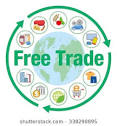Since the EU has negotiated a virtually free trade agreement with Japan and is offering the prospect (after president Trump’s talks with the EU Commission President Jean Claude Juncker) of tariff free trade with the USA, the UK can now trade freely with the EU – and without paying a penny – because international law says so.
Japan and the EU have agreed to eliminate 90% of trade tariffs between them – without Japan being in the Single Market nor in the Customs Union, nor without paying a fat fee to the EU budget! So the UK can do the same under World Trade rules.
Trump and Juncker agreed to move towards nil tariffs on trade between the USA and the EU – without the USA paying for the privilege! So the UK can do the same.
Why? Because that is international law. The first law of trade under the World Trade Organisation is the so called “Most Favoured Nation” clause which says that nations and groups of nations must not discriminate between trading partners.
“Grant someone a special favour (such as a lower customs duty rate for one of their products) and you have to do the same for all other WTO members.”
This is the principle of the General Agreement on Tariffs and Trade (on both goods and services) as well as the Agreement on Trade Related Aspects of Intellectual Property Rights.
Trading groups like the EU can give preferential treatment to the nations WITHIN THE BLOCK but not to those outside (like Brexit UK, Japan, the USA etc) There are exceptions but they are not significant. As the WTO states:
“It means that every time a country lowers a trade barrier or opens up a market, it has to do so for the same goods or services from all its trading partners — whether rich or poor, weak or strong.
And that is just what the EU is doing for Japan, Canada and prospectively the USA. So there is no reason why the UK cannot insist on the same tariff free conditions applied in the three EU trade agreements concluded (or about to be concluded) with those countries.
In addition there is a further obligation when it comes to dealing with the UK because it is a European country and a neighbour of the EU. According to Article 8 of the Lisbon treaty, the EU must “develop a special relationship with neighbouring countries, aiming to establish an area of prosperity and good neighbourliness, founded on the values of the Union..….” This alone suggests that any UK deal should be superior to that offered to the non European countries above!
HM TREASURY’S IGNORANCE OF TRADE REALITIES
Michael Burrage (Economists for Free Trade) writes on Brexit Central of the Treasury conviction that a clean break and trade under WTO would be a disaster:
“they relied on a flawed pseudo-gravity model, incorporated wildly improbable assumptions, ignored conflicting evidence and gave misleading interpretations of cited sources, questions about their competence and honesty can already be raised”
He points out that in 2013 the Treasury study said that the UK’s membership of the Single Market had boosted trade by 9%. In 2016 they said (to please the euro-fanatic Chancellor George Osborne) that we had benefited by 115% – a miraculous difference!
Burrage says the Treasury has not compared other countries with the UK when it comes to benefits from trade and avoids the facts that:
“the largest value goods exporters to the EU12 over the years 1993-2015, trading as most favoured nations under WTO rules, …..grew by 135% over the period and those trading under bilateral arrangements grew by 107%. …..four times more than UK exports to the other eleven, which grew (only) by 25%.”
FARCICAL ILLEGAL CHEQUERS TRADE PROPOSAL
Professor David Collins, professor of International Economic Law, claims that Mrs May’s proposed “Facilitated Customs Arrangement” would put off other countries trading with us and would even break World Trade Organisation rules:
“It is hard to believe that a third country would agree to offering lower tariffs to UK exports when that third country’s exports to the UK would be subject to a higher EU tariff at the border, subject to the promise that there will be a rebate at a later stage pursuant to a cumbersome tracking procedure.”
It is difficult to conceive of a post Brexit customs and trade plan which manages to be
complicated and costly
stop the UK making other trade agreements,
contradict World Trade Organisation rules
and still be unacceptable to the EU
But May has come up with it in the Chequers proposals. Those proposals must go – along with their proposer. The EU will be forced to trade on fair international trade terms with the UK as explained above.


















